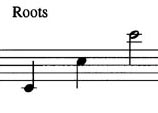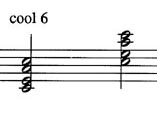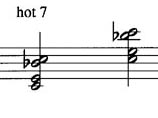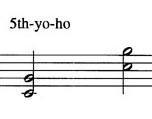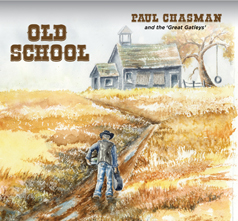Musical Language - June 26, 1999
 Music
is a language. Any principle that we know about learning a verbal
language applies to music as well. For example, when we first learn
to speak a foreign language, we concentrate intently on forming
our mouth to make new sounds. We fish through our minds to come
up with Music
is a language. Any principle that we know about learning a verbal
language applies to music as well. For example, when we first learn
to speak a foreign language, we concentrate intently on forming
our mouth to make new sounds. We fish through our minds to come
up with the words and to construct the sentences that will express what we want to say. Later, when we are fluent in the language, we don't think about what our tongue, lips, and jaw muscles are doing when we speak. Usually, in normal conversation, we don't think too hard about how to say something; we just say it. When we play guitar, first we go through a process of intense concentration on the fingers, building the strength, coordination, and independence to make them cooperate. We have to think about every note and chord, and sometimes go through complicated computations in our mind to find what we are looking for. As we become more skilled, these processes become more automatic. We have a feeling, that feeling gets translated into a sound, the sound is translated to a place on the guitar, and the fingers respond. It all happens spontaneously and simultaneously. It is a very similar process to speaking. We speak through our instrument. We play. With this in mind, I believe it is important for the musician to develop reflexes to respond to whatever musical stimuli emerge. Our ear may be the strongest ally we have, because if we hear a sound and can identify it, we can then find the means to play it. If we try to play a piece without being able to hear what is going on, it is similar to trying to learn a speech in a foreign language we don't understand. When I talk about "what is going on," I am referring
to something even deeper than identifying the intervals. Music
is saying something. When I play music, I am aware of
an array of abstract feelings, thoughts, and images that flood
through the melodies and chords. I hear more than intervals in
music; I hear the atmosphere that those intervals create.
The following is a list of some of the more basic associations
that I make. Please bear in mind that these are only my associations.
Yours might be quite different. It's not as if you can say, "A
'C' chord isn't green, you idiot, it's red!" The important
thing isn't what your associations are, it's that you have some.
(By the way, for the record, a 'C' chord is blue-green.) Anyway,
here are some of the associations I make with some some basic
chords and intervals:
These are some of the more basic associations I make with generic chords in no particular context. When you throw them into the musical soup, it can get much more complicated than this. But I use these as examples of the kinds of images that music conjures up for me. What are yours? BACK TO ARCHIVES
|

